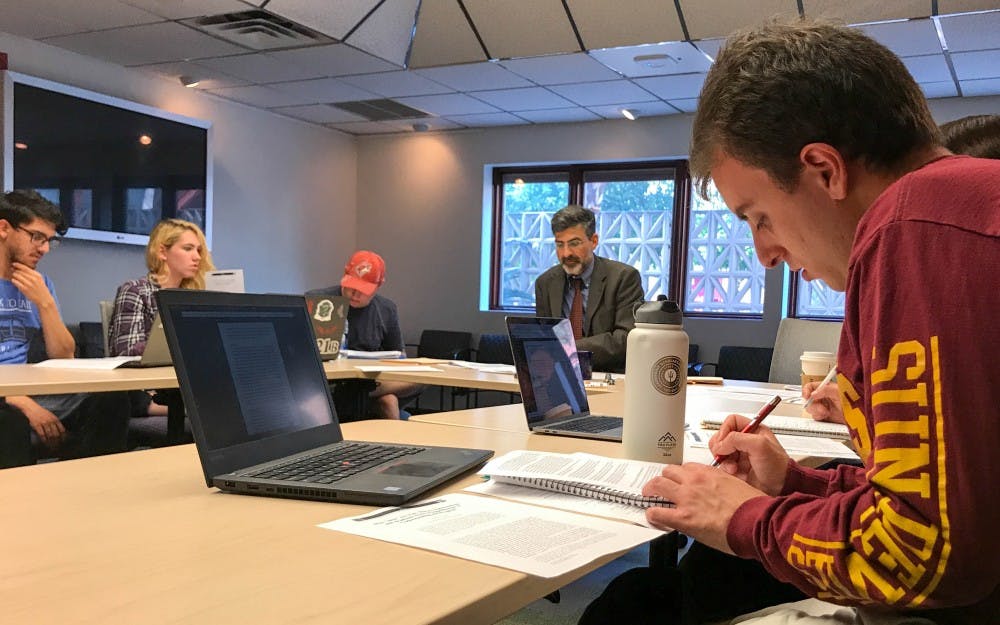It’s been an interesting first year for ASU’s School of Civic and Economic Thought and Leadership.
The school, which launched in spring 2017, is dedicated to “inspiring leadership and statesmanship for the common good." But the school's Western-centric approach to philosophy and economics has led to scrutiny from outlets such as the New York Times, the Chronicle of Higher Education and the Arizona Republic.
Founding Director Paul Carrese, ASU President Michael Crow and some SCETL students think this criticism is unfair — and they’re making their disappointment known.
In late February, the New York Times published a story about the school titled “Arizona Republicans Inject Schools of Conservative Thought Into State Universities.” In it, journalist Stephanie Saul calls SCETL a “pet project” of Republican legislatures in their effort “to counteract what they see as excessive liberalism on campus.”
The Arizona State Legislature has designated millions of dollars to the school, which also incorporates two controversial think tanks, the Center for Political Thought and Leadership and the Center for the Study of Economic Liberty. Both think tanks have received generous grants from the Charles Koch Foundation.
Carrese said he acknowledges that the school’s beginnings are unusual and could raise suspicion. But he said the school’s roots and funding sources are not tied to its curriculum.
“I can understand that the unusual origins of the school and the role of Koch Foundation money would raise concerns,” he said. “But ... we’re up and running. We have a record now.”
Beyond its academic courses, SCETL also hosts lectures on public policy and polticial issues, which this year have focused on free speech. Next year, Carrese said the theme for the program will be polarization and civil disagreement.
Among criticisms the school has received, one of the largest is that it emphasizes the works of white men at the expense of women and people of color. Partially in response to this criticism, Carrese said, this fall the school will offer a course called “Women in Political Thought and Leadership." The course acknowledges the “role of women in the family and society is a persistent and foundational theme in the history of political thought,” according to its description.
For his part, ASU President Michael Crow expressed frustration with the Times article in an interview with The State Press on March 2. He rejected the ideas that the University is serving the legislature’s political interests and that SCETL is a bastion of conservative thought.
“The reporter was here – she’s a good and faithful reporter … but she had a preconceived notion, in my view, about what we were doing here,” he said.
Crow said that the school focused on classical — but not conservative — thinking.
“Many conservatives are attracted to that classical thinking – fine, good,” he said. “Thomas Jefferson was a conservative. Many American leaders and philosophers were conservative.”
Carrese said that he and most school faculty are intellectual conservatives, but not necessarily partisan or political. He said he distinguishes intellectual conservatism from political or moral conservatism.
“Those of us who are intellectual conservatives might lean in a certain direction when we select materials for a syllabus, or we present materials, but mostly what we’re showing in those public affairs sessions is what I see us doing in our classrooms, which is to be socratic,” he said.
This semester, Carrese teaches “Statesmanship and American Grand Strategy.” On a Tuesday afternoon in late March, he sat around a conference table with nine students on the Tempe campus, discussing foreign policy theory, quoting Aristotle and Machiavelli, explaining different types of Greek and Roman columns and comparing international relations under Bush, Obama and Trump.
“Did I give you the French version?” he asked, chuckling, when students didn’t respond to a question he posed about the week’s reading.
Prior to joining ASU, Carrese spent 18 years as a professor at the Air Force Academy, where he said cadets are taught to be non-partisan civil servants.
“Sure there are partisan differences, but you are a servant of a deeper, common whole community,” Carrese said. “That’s part of what I’m trying to bring to the students at ASU.”
SCETL students also joined Crow and Carrese’s defense of the school. Justin Heywood, a political science and Spanish sophomore who is quoted in the Times article, called it a “hit piece” in a Facebook comment responding to the article.
Heywood said he didn’t feel the school was giving him a partisan education.
“With every argument, they always provide a counter argument, and there’s no way it’s leaning one way or the other,” he said.
Heywood went with the school on its trip to India this spring break, which he said was his first time studying abroad and an eye-opening experience.
Carrese said the India trip, which was offered to select SCETL students at nearly no out-of-pocket cost, was one of a number initiatives to try to increase enrollment in the school, but he said classifying it as a free vacation misses the mark. He said the trip was an important part of the school’s efforts to build leadership with an international dimension.
Carrese also said that he wants anyone with concerns or questions about the school to bring them to the school’s attention.
“I’m a real flesh-and-blood person. I’m not hiding under a bush somewhere,” he said. “Talk to us. Come talk to us.”
Reach the reporter at maarmst7@asu.edu or follow @MiaAArmstrong on Twitter.
Like State Press on Facebook and follow @statepress on Twitter.




